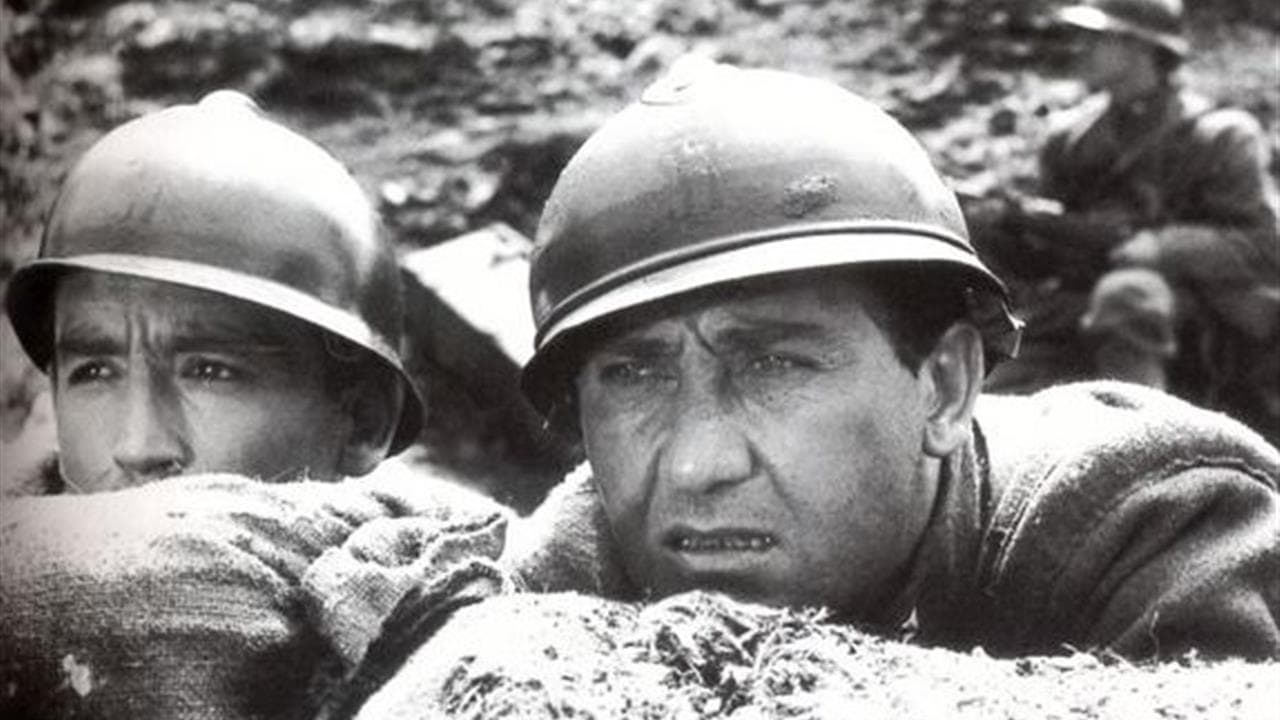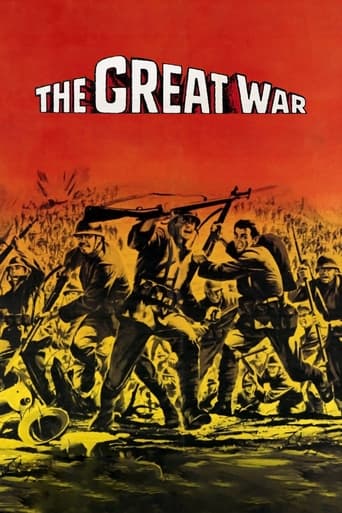Flyerplesys
Perfectly adorable
Comwayon
A Disappointing Continuation
Tobias Burrows
It's easily one of the freshest, sharpest and most enjoyable films of this year.
Edwin
The storyline feels a little thin and moth-eaten in parts but this sequel is plenty of fun.
MARIO GAUCI
When I attended the 61st Venice Film Festival in September 2004, I saw Italian veteran film-maker Mario Monicelli several times taking a stroll by himself but, given his reputation for cantankerousness and irascibility, I thought better not to bother him; you can imagine how guilty I felt when the 95-year old frail director committed suicide by jumping out of a Roman hospital window in November 2010! Monicelli, who does not get a single mention in the "Wonders In The Dark" 3000-strong list(!), belongs with other notable Italian film directors like Pietro Germi, Elio Petri, Dino Risi, and Ettore Scola whose work had long been unjustly overshadowed by the big five, namely Antonioni, De Sica, Fellini, Rossellini and Visconti. Best-known for his classic, star-studded caper spoof BIG DEAL ON MADONNA STREET aka PERSONS UNKNOWN (1958) – a Best Foreign Language Film Oscar contender that is still my favourite among his films and, possibly, my favourite comedy not in the English language, period! – but THE GREAT WAR (that was equally recognized by the Academy) is probably his masterpiece. Winner of the Golden Lion at the Venice Film Festival – tied with Roberto Rossellini's WWII drama IL GENERALE DELLA ROVERE starring Vittorio De Sica both here – over such superior titles as Otto Preminger's ANATOMY OF A MURDER, Kon Ichikawa's CONFLAGRATION and Ingmar Bergman's THE MAGICIAN (both 1958) – and at the David di Donatello awards, Italy's own equivalent of the Oscar, it is still underrated enough to have been given a baffling ** rating by "Leonard Maltin's Film Guide" – where, incidentally, its running time is given as 118 minutes, rather than the full 137 minutes – and the non-English-friendly Italian 2-Disc Set (which, after missing out on it a couple of times on TV over the years, is how I eventually watched it on the centenary of WWI, no less…albeit jettisoning the supplements altogether due to time constraints) is still its only home video release worldwide. The film's constant veering between drama and comedy requires some initial adjustment from the viewer but it eventually reaches an exquisite seamlessness. Leading man Vittorio Gassman had been renowned for drama up to his revelation as a comic actor in the aforementioned BIG DEAL ON MADONNA STREET; conversely, his sparring partner here Alberto Sordi was popular for his own comedy vehicles prior to this; indeed, Sordi would again go to war in two notable subsequent films: Luigi Comencini's similarly bittersweet EVERYBODY GO HOME! (1960) and the more typically comic THE BEST OF ENEMIES (1961; co-starring David Niven). THE GREAT WAR is an impressive Dino De Laurentiis production, notable for distinguished cinematographer Giuseppe Rotunno's sinewy tracking shots along the trenches and Mario Garbuglia's award-winning expansive sets. The film also offers a showy role for De Laurentiis's actress wife Silvana Mangano as the proverbial whore with a heart of gold who possibly bears Gassman's child; interestingly, this is just one of several Gassman-Mangano teamings that included the star-making BITTER RICE (1949) and the epics TEMPEST (1958) and BARABBAS (1961). To portray the colourful supporting characters that make up the irrepressible duo's comrades-in-arms, an excellent cast of familiar character actors was dutifully enrolled: Bernard Blier, Romolo Valli, Folco Lulli, Livio Lorenzon, Tiberio Murgia (returning from BIG DEAL ON MADONNA STREET), Ferruccio Amendola and Gerard Herter.Considering its significant length, it is understandable that the film follows an episodic structure but is decidedly replete with memorable vignettes: new enlistee Gassman bribing 'veteran' Sordi to avoid joining the Army in the opening scene; Gassman and Murgia's punishment for waking up late in the barracks is to have their hair completely shaved off; Gassman and Sordi asking their chaplain the way to the local brothel and he points them to Mangano's modest but highly popular dwelling; Amendola being constantly hit by the barracks' door whenever it is opened to herald a newly-arrived army bigwig on a morale-boosting tour of the trenches; cultured Valli being pestered by an illiterate private to write love letters to his beloved and read his mail and eventually having to lie to him when the local priest replies that she has married a rich old man; a messenger is killed when delivering a note from HQ that only wished a Happy Christmas to the troops (which causes the much-loved and usually well-behaved Lulli to throw a cup of brandy in his overzealous young superior' face); Murgia is constantly waxing about his love for famous actress Francesca Bertini but, when he does actually receive word from her, he tears up the letter after yet another casualty-ridden assault on their trenches; Gassman and Sordi giving their money, collected for an intended visit to a whorehouse, to Lulli's as-yet-unaware widow whom they chance to meet at the train station – subsequently joining a band of soldiers partying there amongst themselves with a minimum of girls to go around; Gassman and Sordi are continually volunteering for missions to shirk trench duties and often save their lives in the process: this stretch of good luck catches up with them at the end when the remote outpost they have ventured to is unknowingly abandoned by their army and they find it occupied by the Austrian enemy when they wake up the following morning; this leads to their heroic death when they refuse to divulge attack plans to Herter, followed by the film's sublimely ironic closing sequence where their long-suffering sergeant Lorenzon complains that these two ne'er-do-wells have once again managed to have it the easy way, cutting to an image of their lifeless bodies, and back again!
Gerald A. DeLuca
(Includes spoilers!) THE GREAT WAR stands as one of the essential films exemplifying the "commedia all'italiana" genre, that is, films which while being comedies often have a serious, even tragic undertone. Take our two heroes here, the Roman Oreste Jacovacci and the Milanese Giovanni Busacca (Alberto Sordi and Vittorio Gassman). Caught in the insanity of World War I, this Abbott and Costello duo will do anything to escape danger and responsibility. After being fairly successful at the game, they have the misfortune to fall into the hands of the enemy Austrians, who want to pump them for information. But these two connivers and shirkers, in a rush of untapped patriotism, are unwilling to cause the possible deaths of their compatriots and so will chose or allow themselves to die instead. Circumstances turn cowards into heroes, much in the same way the con-artist played by De Sica in IL GENERALE DELLA ROVERE soars to lofty nobility at the end of that film, completed that same year. Talented director Mario Monicelli has filmed a gritty panorama of the World War I, Italy's first real film on the subject, in which the visuals and the overall "feel" are utterly convincing. The great cinematographer Giuseppe Rotunno has captured the same period feeling that is akin to old-photographs-come-to-life that we would see later in his 1963 I COMPAGNI (THE ORGANIZER). Here he works in wide-screen CinemaScope that is especially effective in following movements of large numbers of soldiers in the battle scenes. The music by veteran Fellini-composer Nino Rota is appealing, and we get the songs and popular chants of the era. Silvana Mangano provides feminine interest as a crafty prostitute. This is a major Italian film of the 1950's and it should be far better know
roberto dandi
Monicelli is another genius and poet of the Italian cinema. We can only bless him for the long list of masterpieces he created for all of us: I soliti ignoti, Guardie e ladri, L'armata Brancaleone and of course La Grande Guerra. Two cowards, one from Rome (Sordi) the other from Lombardy (Gassman) try to save their lives during one of the most tragic moments (for Italy) of the WWI (the defense on the river Piave). While in some parts the film is truly a blame against the horrors of war, in other parts is somehow patriotic. Even the tragic final changes the protagonists into heroes, but really a strange kind of heroes, very different from the American icon (muscles and bravery). In conclusion, you will find a lot of fun but also thoughtful moments. I beg everyone who read this message to see this movies, it's truly one of the best ever.
mantus
La Grande guerra is one of the underseen, undervalued hordes of sublime European films that never see the light of day.In the 1960s in the centre of London there was the Academy, Oxford Street, Curzon, Mayfair and one of two other cinemas where the delights of the European cinema were on view. I have lived in Oslo since 1990. It is a cinema friendly city, but overloaded with Hollywood rubbish like most Bruce Willis actioners, or Nicolas Cage going for the money and not to expand his substantial talents as he has done in the past.This is not intellectual snobbery, just a cry from the heart about the lack of quality that is so endemic in current films."Crouching Tiger, Flaming Dragon" - I forget the real title is an example of American audiences accepting the quality of non-US movies."Die Hard"-type movies are good only to perhaps release aggression. It shows the typical obsessive need for America to breed only heroes. The villains with the fantastic exception of John Malkovich are usually superb English actors with foreign accents. Alan Rickman in "Die Hard" and Jeremy Irons in one of the mindless sequels.U571, now the most popular film in video shops where I live is such a devasting con-trick. A real piece of history when a British submarine acquired the Enigma decoding machine which made a significant difference for the Allies to get advance information about German war plans. The heroes are American. Sickening. Dramatic licence is one thing, but fraud is another. The event occurred six months before the US even entered the war. These are well-known complaints.Reminds one of the crassness of putting of Warner Bros. promoting "Objective Burma" in the autumn after the end of the war. Depiction of Errol Flynn (unfit for war service) winning against the Japanese military with not one British soldier in sight.Reminds me of the stories of a close friend and veteran of World War II. The US Army using earthmoving machinery to dig trenches when the British had shovels, the often sidelining of American troops due to the prevalence of veneral disease. The stories of British and other troops relieving American positions with a quarter of the manpower.In movies, with the exception of garishly-suited black pimps in stretch limos, the villains in movies and TV series used BMWs, and other European cars, which also were often beset with engine problems. Unlike the perfection of GM, Ford models etc._Don't get me wrong. With the exception of a mad Bellevue, New York psychiatrist I had once Americans are certainly charming, friendly people.La Grande Guerra is one of the thousands of films that ought to be revived every 10 years like a classic Disney feature.

